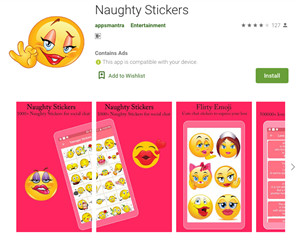5 Emoji Sexting Apps: Why Should Parents Notice?
ALL TOPICS
- Social App Review
-
- Best texting app for kids
- ChatGPT Detectors
- ChatGPT Examples
- TikTok App Review for Parents
- ChatGPT Impact on Education
- Discord App Review
- Jailbreak ChatGPT
- Age for TikTok
- Dangerous Live broadcasting apps
- PopJam App Review for Parents
- Is Funimation Safe?
- Random video chat app
- Stranger chat apps review
- Anonymous chat apps for Teens
- Bigo live app review
- Is Google hangouts safe?
- Game Review
- Other Reviews
Dec 12, 2025 Filed to: Trending App Review Proven solutions
In today's digital landscape, seemingly innocent emoji apps pose serious risks to children's safety and wellbeing online.
Emoji sexting apps, which use emojis to convey explicit sexual messages, have gained popularity among teens and young adults. These apps allow users to send coded messages that can be difficult for parents and educators to detect, leading to potential harm and exploitation.
As parents and guardians, it's crucial to understand the risks associated with emoji sexting apps and take steps to protect your children. In this article, we'll explore the dangers of emoji sexting apps, why they're popular among teens, and essential protection strategies for parents.
Table of Contents
Part 1: What Are Emoji Sexting Apps
Emojis have evolved from simple digital expressions into a sophisticated communication language. However, this innocent tool has taken a concerning turn. Teenagers increasingly use emojis as coded language for sexual communication—what experts call "emoji sexting"—using seemingly innocent symbols to convey explicit messages.
This trend allows users to express sexual content without explicit words, making it harder for parents and monitoring systems to detect inappropriate conversations. According to JAMA Pediatrics research, one in seven teenagers send sexts, while one in four receive them.
Understanding emoji sexting apps and their risks is crucial for parents who want to protect their children while fostering healthy digital communication habits.
Part 2: Why Are Emoji Sexting Apps So Popular Among Teens?
The digital revolution has fundamentally transformed how teenagers communicate and express themselves. The integration of electronic media into intimate communication represents a significant shift in how young people navigate relationships and sexuality in our technology-driven society.
Several key factors contribute to the popularity of emoji sexting among adolescents:
- Secret Language Appeal: Emojis create a sense of coded communication that teens believe adults cannot easily understand, providing a feeling of privacy and exclusivity.
- Device Accessibility: The widespread availability of smartphones and digital devices has made emoji communication instantly accessible to most teenagers.
- Social Media Integration: The rise of social platforms and dating apps has normalized emoji-based flirting and romantic communication.
- Peer Pressure and Social Status: Research indicates that the desire to fit in and appear sophisticated can increase the likelihood of teens engaging in sexting behaviors.
- Perceived Safety: Many teens mistakenly believe that emoji communication is safer or less explicit than traditional sexting, not understanding the potential consequences.
According to recent studies from the Family Online Safety Institute (FOSI), teens across different demographics are increasingly using digital platforms for romantic communication, with emoji-based messaging becoming a normalized part of teenage relationships. Here you can learn some fruit emojis meaning.
Part 3: 5 Popular Emoji Sexting Apps That Concern Parents
The digital marketplace is saturated with applications specifically designed to facilitate sexual communication through emojis and emoticons. While these apps claim to target adults, they often lack proper age verification mechanisms, making them easily accessible to minors. Understanding these platforms is essential for parents who want to protect their children from inappropriate content and potential exploitation.
Important Note: The following information is provided for educational purposes to help parents identify potentially harmful applications. These apps pose significant risks to minors and should be avoided by underage users.
1. Flirty Emoji Adult Icons
This application offers an extensive library of over 500 romantic, flirtatious, and sexually explicit emojis. The app markets itself as providing "creative" options for digital intimate communication. Critical concerns include:
- No effective age verification system
- Explicit sexual content inappropriate for minors
- Easy accessibility through app stores
- Potential for misuse by predators targeting young users

2. Sexy Emoji & Sexy Emoticons
This platform combines emojis with animated GIFs and text stickers organized into eleven categories. The app's concerning features include:
- No registration required, allowing anonymous access
- Content rated for users 17+ but easily accessible to younger users
- Diverse variations of sexual imagery and suggestions
- Integration with popular messaging platforms

3. Flirty Dirty Emoji – Adult Emoticons for Couples
Marketed as relationship enhancement tools, these apps contain extensive libraries of sexually explicit content. Key risks include:
- Hundreds of inappropriate emoticons categorized by explicit themes
- Content that normalizes sexual communication among young users
- Potential grooming tools for predators
- Easy sharing capabilities across social platforms

4. Flirty Love Emoji
This application combines romantic and sexual content, making it particularly concerning as it blurs the line between innocent flirtation and explicit communication. Risks include:
- Massive library of sexual imagery disguised as "romantic" content
- Colorful, appealing interface that attracts younger users
- Integration with popular social media platforms
- Potential gateway to more explicit content and behaviors

5. Naughty Stickers
Positioned as a keyboard enhancement tool, this app provides direct access to explicit content through regular messaging apps. Major concerns include:
- Integration with standard device keyboards
- Hundreds of explicit emoticons and stickers
- Categories that progressively introduce more explicit content
- Universal compatibility with messaging platforms

Part 4: Why Emoji Sexting Apps Pose Serious Risks to Children
The proliferation of emoji sexting applications presents multifaceted dangers that extend far beyond inappropriate content exposure. Understanding these risks is crucial for parents, educators, and policymakers working to protect children in the digital age.
Digital Safety and Privacy Risks
- Data Vulnerability: Photos, videos, and messages can be intercepted by cybercriminals or malicious actors
- Permanent Digital Footprint: Content shared through these platforms can be saved, screenshot, and redistributed indefinitely
- Lack of Encryption: Many apps lack proper security measures, making private communications vulnerable to breaches
Psychological and Social Consequences
- Manipulation and Coercion: Teens can be easily pressured into sharing increasingly explicit content
- Sextortion: Criminals may use shared content to blackmail victims for money or additional explicit material
- Revenge Porn: Former partners may share intimate content maliciously after relationship breakdowns
- Cyberbullying: Shared content can become ammunition for harassment and social ostracism
Legal and Regulatory Concerns
- Age Verification Failures: Most apps lack effective mechanisms to verify user age, allowing easy access by minors
- Predator Access: These platforms often attract individuals seeking to exploit vulnerable young users
- Legal Consequences: In many jurisdictions, sexting involving minors constitutes child pornography, carrying serious legal penalties
As digital safety expert Erika Moen warns: "There is an unavoidable risk that your sexts will be seen by someone other than the intended recipient." This risk is amplified exponentially when minors are involved, as reported by PC Magazine's comprehensive safety guide.
Part 5: Essential Protection Strategies for Parents
Protecting children from emoji sexting apps requires a balanced approach combining education, communication, and technology. Here are four key strategies based on the latest child safety research:
1. Open Communication
Start age-appropriate conversations about digital safety early. Create an environment where children feel safe reporting concerning interactions. Focus on education rather than punishment to encourage honesty about online experiences.
2. Smart Device Management
Implement graduated access to devices based on demonstrated responsibility. Encourage device use in shared spaces and establish clear time boundaries. Balance supervision with age-appropriate independence.
3. Know When to Seek Help
Contact authorities immediately if you suspect grooming, exploitation, or if explicit content involving minors has been shared. Don't hesitate to report threats, blackmail, or predatory behavior.
4. Use Parental Control Tools
Modern parental control solutions like FamiSafe offer comprehensive monitoring and protection features including content filtering, app blocking, and real-time alerts for concerning activity.
FamiSafe: Comprehensive Digital Protection for Families
FamiSafe represents a leading solution in family digital safety, offering comprehensive monitoring and protection tools designed specifically for today's connected families. This all-in-one platform addresses the complex challenges parents face in protecting children from online risks while fostering healthy digital habits.
- Advanced Web Filtering
- Real-time Location Tracking & Geo-fencing
- Intelligent App Monitoring & Control
- Flexible Screen Time Management
- AI-Powered Content Detection
Advanced Content Detection and Monitoring
FamiSafe's sophisticated monitoring capabilities help parents stay informed about their children's digital activities without being overly intrusive. The platform uses advanced algorithms to detect potentially harmful content across multiple platforms and communication channels.
- Real-time Monitoring: Continuous scanning of social media, messaging apps, and web browsing activity
- Keyword Detection: Automatic alerts for concerning language or topics in digital communications
- Image Analysis: AI-powered detection of inappropriate visual content
- Behavioral Pattern Recognition: Identification of unusual communication patterns that may indicate risks
Smart App Management and Control
FamiSafe's app management features provide parents with detailed insights into their children's app usage patterns while offering flexible control options that can be adjusted as children mature.
- Detailed Usage Reports: Comprehensive analytics showing time spent in each application
- Selective App Blocking: Ability to restrict access to specific applications during certain times or permanently
- Installation Monitoring: Alerts when new apps are downloaded or installed
- Age-Appropriate Recommendations: Suggestions for suitable apps based on child's age and interests
Comprehensive Web Safety and Filtering
The platform's web filtering capabilities ensure children can explore the internet safely while learning digital literacy skills. FamiSafe's intelligent filtering system adapts to evolving online threats and content.
- Dynamic Content Filtering: Automatic blocking of inappropriate websites across multiple categories
- Browsing History Analysis: Complete visibility into web browsing activity, including private browsing sessions
- Safe Search Enforcement: Automatic activation of safe search features across search engines
- Custom Filtering Rules: Ability to create family-specific web access policies
Understanding the Comprehensive Dangers of Teen Sexting
Based on the latest research from child safety organizations and digital wellness experts, sexting among teenagers presents multiple interconnected risks that can have lasting consequences:
- Psychological and Emotional Impact: Exposure to sexual content at young ages can lead to distorted views of relationships, body image issues, and premature sexualization
- Legal Consequences: In many jurisdictions, sexting involving minors constitutes child pornography, potentially resulting in criminal charges, sex offender registration, and permanent legal records
- Exploitation and Predation: Sexting apps often serve as hunting grounds for predators who target vulnerable young users through manipulation and grooming tactics
- Reputation and Future Impact: Digital content can resurface years later, potentially affecting college admissions, employment opportunities, and personal relationships
- Cyberbullying and Social Harm: Shared intimate content frequently becomes ammunition for harassment, social ostracism, and psychological abuse
Understanding these risks is the first step toward effective protection. The next crucial element is implementing comprehensive strategies that combine education, communication, and appropriate technological safeguards to create a safer digital environment for children.
Conclusion
As digital communication continues to evolve, emoji sexting apps pose genuine risks to young users through inadequate safety measures and potential exploitation. While these challenges are serious, parents can take meaningful action to protect their children.
Success comes through balanced approaches: fostering open dialogue about online safety, implementing age-appropriate device guidelines, and utilizing reliable monitoring tools when needed. The goal isn't to eliminate technology from children's lives, but rather to create secure environments where they can develop healthy digital habits and critical thinking skills for the future.



Thomas Jones
chief Editor